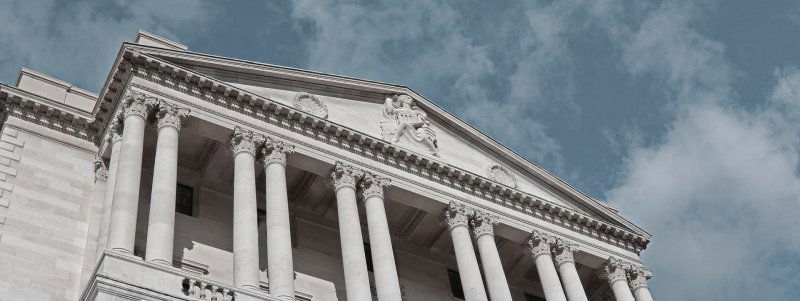Dialogue with the Bank of England

The New Chartist Movement's Letter
On the 18th May 2020, Justin Walker wrote to Andrew Bailey, Governor of the Bank of England, to present an historical solution immediately to prevent the British economy from experiencing a financial Armageddon. The proposed solution was, of course, the Bradbury Pound, otherwise known as 'Sovereign National Credit', 'Sovereign Money' or, technically, 'M0 at 100%'. The letter addressed four problem areas and posed specific, numbered questions in each area.
Read our letter
The Bank of England's Reply
After five weeks of waiting and two reminders, an incomplete reply was received from one 'Charles' on behalf of Andrew Bailey. The following lists the questions posed and comments on the answers received:
Problem Area One
1. How can you interpret ‘fractional reserve lending’ as being anything other than Common Law fraud?
Unanswered, other than "It is not role of the Bank of England to provide opinions or general commentary."
There was no discussion of fractional reserve lending or fraud.
2. Should private corporations have the ‘right’ to create and issue money completely out of thin air as debt?
'Charles' argues that the Bank of England must operate according to the terms of the Bank Charter Act 1844 and explains the laws and regulations under which commercial banks operate in the United Kingdom. He states that the law allows commercial banks to create money through lending but that this power is not without limit—that the combined pressures of the requirement of banks to operate profitably and those of monetary policy and prudential regulation serve to limit the amount of money creation and to keep the inflation rate low and stable.
Problem Area Two
1. How can the Bank of England be said to be ‘nationalised’ and how can it be viewed as being ‘independent’ when it is clearly answerable to this privately-run international institution that relies on the utmost secrecy and lack of transparency to run its affairs?
"The Bank of England is wholly owned by the UK Government. The Bank was nationalised in 1946. All private stock in the Bank was acquired by the UK Government at this time. However, we are operationally independent..." No mention of the Bank for International Settlements nor the secrecy entailed therewith.
2. As the newly-appointed Governor of the Bank of England, who do you effectively take your orders from—the Chancellor of the Exchequer or those unelected and unaccountable private ‘investment bankers’ who hold sway at the Bank for International Settlements?
"The Bank of England is accountable to Parliament through our appearances at Treasury Select Committee hearings... Ultimately these powers are given to us by UK Government. The Court of the Bank of England governs us." Again, no mention of the Bank for International Settlements or the extent to which its edicts direct the deliberations of the Court of Directors or the operations of the Bank, which as previously noted, are independent of government interference.
3. Why has the BIS been allowed by the international community to enjoy full diplomatic immunity? What is it so scared of?
Unanswered, other than suggesting we ask the Bank for International Settlements directly.
4. Do you share the minutes taken at these very secretive BIS meetings with all of your current Directors of the Bank of England; and does this include Frances O’Grady, the General Secretary of the TUC, who was recently appointed as a non-executive Director of the Bank of England to represent the Trade Union Movement? In other words, just how informed is she as regards the private central banking system at its very highest level? Or, come to that, how informed is the whole membership of the Trade Union Movement?
"A wealth of information is shared with our Court (and therefore its members). This includes information about meetings which senior members of Bank Staff attend. The minutes of our Court meetings are publically available..." Charles doesn't specifically say that BIS meeting minutes are shared with the Directors. He says we should ask the trade unions directly.
Problem Area Three
1. Do you still support the global implementation of this Green New Deal and UN Agenda 2030 even though it can be proved beyond all reasonable doubt that it is based on completely flawed science?
"We would not agree with your personal view, and remain supportive of all international and national efforts in the fight against climate change. The Bank remains committed to working on matters of climate change relevant to our remit." No surprises there, especially given ex-Governor Mark Carney's new rôle in bludgeoning private enterprise with onerous fake green decarbonisation measures!
2. Are you supportive of a Central Bank Digital Currency?
"The Bank has not yet made a decision on whether to introduce CBDC, and intends to engage widely with stakeholders on the benefits, risks and practicalities of doing so. We are therefore conducting research in this field, both on how a potential design may work, and the implications for the people of the United Kingdom..."
3. Do you see any future for cash and notes as convenient units of exchange for goods and services?
"The Bank of England is committed to providing high quality banknotes which meet the demands and needs of the people of the United Kingdom. We are also committed with working with relevant stakeholders to ensure access to cash for those who need it..." Surprisingly encouraging, though we doubt they'd admit to any plans to abolish cash.
Problem Area Four
1. Will you now please acknowledge that a sovereign nation’s government does not have to borrow money from the private financial sector?
2. Will you confirm publicly the success of the 1914 Treasury-issued Bradbury Pound?
3. With the evidence presented to you here, do you now accept that there is now absolutely no need at all to have the Bank of England as part of our nation’s governance? Indeed, wouldn’t it be more sensible to have HM Treasury take over completely the Bank of England and to then set up a network of Regional and Local Public Banks to administer this new fiscal arrangement of Sovereign National Credit for the financial benefit of everyone?
"These are questions for HM Treasury. You may wish to write to them directly." A steadfast refusal to engage in any discussion on Sovereign National Credit.
Read their reply
HM Treasury and the Treasury Select Committee
So, the Bank of England has suggested that we could engage directly with Her Majesty's Treasury, and, by implication, the House of Commons Treasury Select Committee. Very well then, watch this space...

